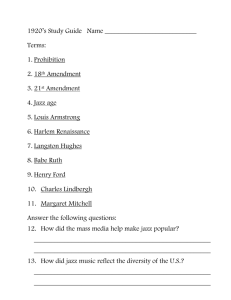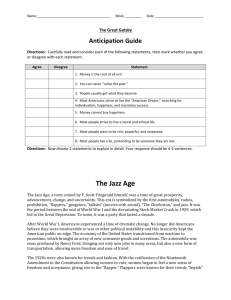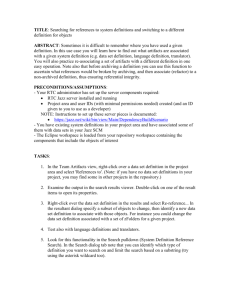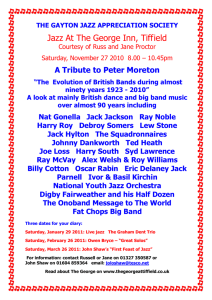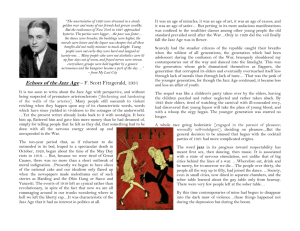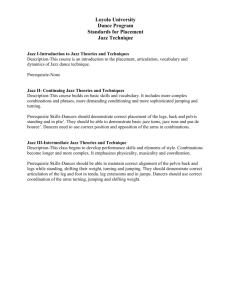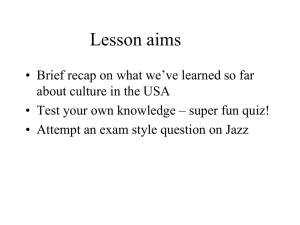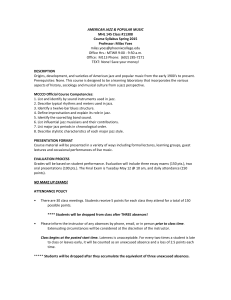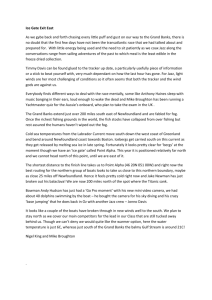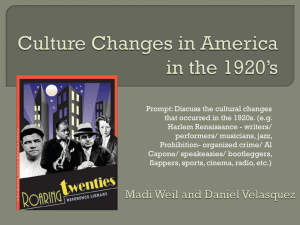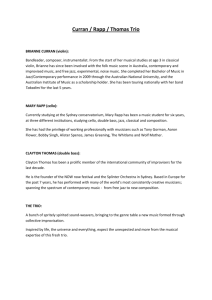Popular Entertainment of the 1920*s
advertisement
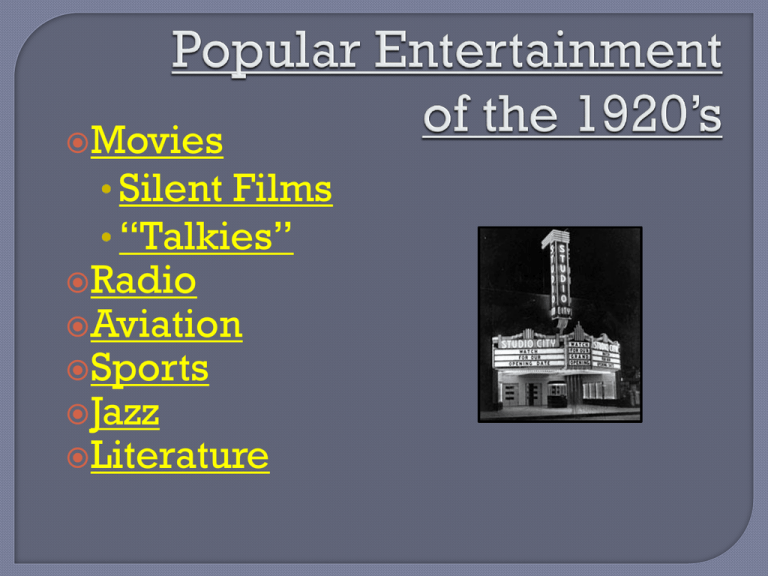
Movies • Silent Films • “Talkies” Radio Aviation Sports Jazz Literature The first movie with sound, or “talkie” was called The Jazz Singer. It starred Al Jolson who was a white Lithuanian immigrant who put on black make up and acted as a black minstrel singer. Before “talkies,” theaters had a piano player who would play musical scores to go along with the action. Charlie Chaplin made it big in the movies as a comedian. http://www.youtube.com/ watch?v=JF38g4z_l_4 Rudolph Valentino was the man all the girls were swooning over. Clara Bow was the woman all the boys were swooning over. In 1922, the MPPDA (Motion Picture Producers and Distributors of America) was formed and lead by a former Republican politician, William H. Hays. Mae West’s hips were censored. They say love is blind...and marriage is an institution. Well, I'm not ready for an institution for the blind just yet. --Mae West Nude scenes were censored. http://www.youtube.com/watch?v=BBgg hnQF6E4 Vacation Trailer Show In 1920 the first radio program was broadcast. For the next 30 years the radio was the major mass media tool. By 1930 there were over 30 million radios in the U.S. They were used for advertisements, entertainment, music, and sporting events. Serial programs (soaps) were very popular. Radio was the key source of information and entertainment in the 1920s. GLENN CURTISS Founder of the US Aircraft industry. America’s most beloved hero of the time wasn’t an athlete but a small-town pilot named Charles Lindbergh Lindbergh made the first nonstop solo transAtlantic flight CHARLES LINDBERGH Was the first to fly his airplane, the Spirit of St. Louis, across the Atlantic Ocean, from New York to Paris non-stop, in 1927. “Lucky Lindy” made his flight in 33 ½ hours. Harold "Red" Grange In the 1920s & 1930s, Babe Ruth & Lou Gehrig were a part of the Yankees’ “Murders Row” because of their powerful hitting. In 1927 Ruth hit a record 60 home runs, which accounted for 14% of all home runs in the American League that year (this record stood until 1961 with Roger Maris). In 1939, doctors at the Mayo Clinic diagnosed Gehrig with a very rare form of degenerative disease: amyotrophic lateral sclerosis (ALS), which is now called Lou Gehrig’s disease. But even baseball was segregated. In 1920 the Negro National League was formed. Satchel Page, pitcher Let’s Go Yankees! Babe Ruth http://www.youtube.com/watc h?v=uS7Iq_I0i6M "Shoeless" Joe Jackson George "Buck" Weaver In the 1920’s everyone loved baseball, even Capone. Swam across the English Channel Endurance Crazes – Flagpole Sitting: His best recorded sit was for 49 days on a flagpole over the boardwalk in Atlantic City, New Jersey. Alvin “Shipwreck” Kelly made $ by “sitting” in front of businesses & attracting patrons. Endurance Crazes – Dance Marathons • Prize money might be $1000, but the real reason to get • • • • involved was because it was the thing to do! One lasted for 119 days and contestants only stopped to use the bathroom. Rules: Keep in perpetual motion. Problems: Dancers became ill and even died. Popular Dance: The Charleston Mah-Jongg: a game with pictured ivory game tiles that need to be matched up (somewhat similar to dominoes) But, people would dress up in kimonos and have parties where ancient Chinese etiquette would be followed (very exclusive). Crossword Puzzles also became popular. Originated in New Orleans from African American Blues and West African rhythms. Jazz was so popular that the 1920’s era was called “the Jazz Age.” Duke Ellington and Louis Armstrong were two famous jazz musicians of the era. • Louis Armstrong was one of the greatest jazz musicians of all time. He introduced jazz to Chicago, and he made jazz his own by playing solos rather than ensembles. Duke Ellington introduced his own blend of jazz in New York. Famous hits were “Mood Indigo” and “Sophisticated Lady.” The Cotton Club was one of the most famous Harlem nightspots where many black entertainers got their start by performing to an all white audience. Bessie Smith was known as “the Empress of Blues” for her emotional singing style and commanding voice. She was one of the highest paying black artists of her generation. Josephine Baker was a well known singer and dancer. She not only performed on Broadway in NYC but in Paris, France. Gertrude Stein’s term for the young poets and writers who listened to jazz, went to speakeasies, and became disillusioned with American materialism. By this she meant that the struggles and footholds of the previous generation no longer existed for the current one A group of American writers who felt out of place and disillusioned in the aftermath of WWI. Literature often spoke of shallow relationships and the fascination with material wealth, and the emotional distress that followed. F. Scott Fitzgerald, pictured here with his wife Zelda, was the leading “voice” of the lost generation. “So we beat on, boats against the current, borne back ceaselessly into the past.” -F. Scott Fitzgerald, from The Great Gatsby “My candle burns at both ends It will not last the night; But ah, my foes, and oh, my friends— It gives a lovely light.” -Edna St. Vincent Millay “We grew up founding our dreams on the infinite promise of American advertising. I still believe that one can learn to play the piano by mail and that mud will give you a perfect complexion.” -Zelda Sayre Fitzgerald An artist know for her use of intense colors. Often used Southwestern themes. The Gershwin Brothers George Gershwin was an American composer. Ira Gershwin often wrote lyrics for George’s music. The average work week decreased from 60 hours to 46 hours in the 1920s. As a result, money spent on amusement and recreation increased by 300%! Entertainment can take various forms. In the 1920s, people entertained themselves with spectator sports, games, movies, and the radio.
